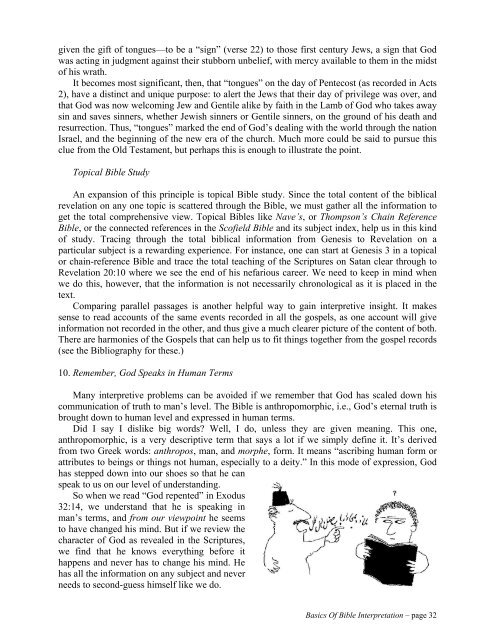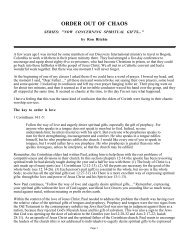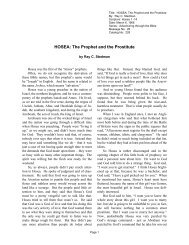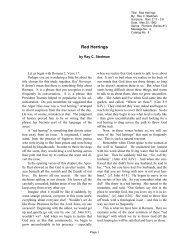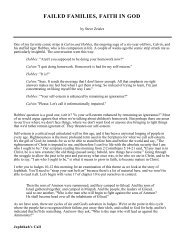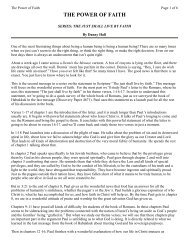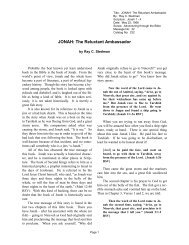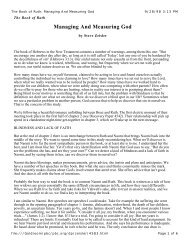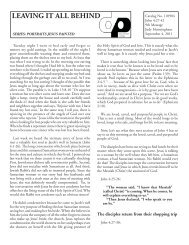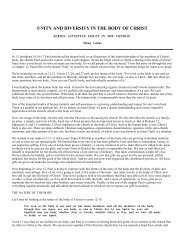Basics of Bible Interpretation - RayStedman.org
Basics of Bible Interpretation - RayStedman.org
Basics of Bible Interpretation - RayStedman.org
You also want an ePaper? Increase the reach of your titles
YUMPU automatically turns print PDFs into web optimized ePapers that Google loves.
given the gift <strong>of</strong> tongues—to be a “sign” (verse 22) to those first century Jews, a sign that God<br />
was acting in judgment against their stubborn unbelief, with mercy available to them in the midst<br />
<strong>of</strong> his wrath.<br />
It becomes most significant, then, that “tongues” on the day <strong>of</strong> Pentecost (as recorded in Acts<br />
2), have a distinct and unique purpose: to alert the Jews that their day <strong>of</strong> privilege was over, and<br />
that God was now welcoming Jew and Gentile alike by faith in the Lamb <strong>of</strong> God who takes away<br />
sin and saves sinners, whether Jewish sinners or Gentile sinners, on the ground <strong>of</strong> his death and<br />
resurrection. Thus, “tongues” marked the end <strong>of</strong> God’s dealing with the world through the nation<br />
Israel, and the beginning <strong>of</strong> the new era <strong>of</strong> the church. Much more could be said to pursue this<br />
clue from the Old Testament, but perhaps this is enough to illustrate the point.<br />
Topical <strong>Bible</strong> Study<br />
An expansion <strong>of</strong> this principle is topical <strong>Bible</strong> study. Since the total content <strong>of</strong> the biblical<br />
revelation on any one topic is scattered through the <strong>Bible</strong>, we must gather all the information to<br />
get the total comprehensive view. Topical <strong>Bible</strong>s like Nave’s, or Thompson’s Chain Reference<br />
<strong>Bible</strong>, or the connected references in the Sc<strong>of</strong>ield <strong>Bible</strong> and its subject index, help us in this kind<br />
<strong>of</strong> study. Tracing through the total biblical information from Genesis to Revelation on a<br />
particular subject is a rewarding experience. For instance, one can start at Genesis 3 in a topical<br />
or chain-reference <strong>Bible</strong> and trace the total teaching <strong>of</strong> the Scriptures on Satan clear through to<br />
Revelation 20:10 where we see the end <strong>of</strong> his nefarious career. We need to keep in mind when<br />
we do this, however, that the information is not necessarily chronological as it is placed in the<br />
text.<br />
Comparing parallel passages is another helpful way to gain interpretive insight. It makes<br />
sense to read accounts <strong>of</strong> the same events recorded in all the gospels, as one account will give<br />
information not recorded in the other, and thus give a much clearer picture <strong>of</strong> the content <strong>of</strong> both.<br />
There are harmonies <strong>of</strong> the Gospels that can help us to fit things together from the gospel records<br />
(see the Bibliography for these.)<br />
10. Remember, God Speaks in Human Terms<br />
Many interpretive problems can be avoided if we remember that God has scaled down his<br />
communication <strong>of</strong> truth to man’s level. The <strong>Bible</strong> is anthropomorphic, i.e., God’s eternal truth is<br />
brought down to human level and expressed in human terms.<br />
Did I say I dislike big words? Well, I do, unless they are given meaning. This one,<br />
anthropomorphic, is a very descriptive term that says a lot if we simply define it. It’s derived<br />
from two Greek words: anthropos, man, and morphe, form. It means “ascribing human form or<br />
attributes to beings or things not human, especially to a deity.” In this mode <strong>of</strong> expression, God<br />
has stepped down into our shoes so that he can<br />
speak to us on our level <strong>of</strong> understanding.<br />
So when we read “God repented” in Exodus<br />
32:14, we understand that he is speaking in<br />
man’s terms, and from our viewpoint he seems<br />
to have changed his mind. But if we review the<br />
character <strong>of</strong> God as revealed in the Scriptures,<br />
we find that he knows everything before it<br />
happens and never has to change his mind. He<br />
has all the information on any subject and never<br />
needs to second-guess himself like we do.<br />
<strong>Basics</strong> Of <strong>Bible</strong> <strong>Interpretation</strong> – page 32


